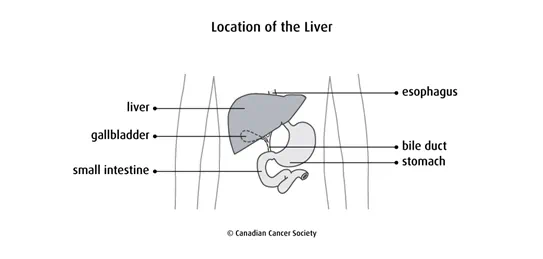What is liver cancer?
Liver cancer starts in the cells of the liver. A cancerous (malignant) tumour is a group of cancer cells that can grow into nearby tissue and destroy it. The tumour can also spread (metastasize) to other parts of the body. When cancer starts in liver cells, it is called primary liver cancer.
The liver is part of the digestive system. It is the largest solid organ in the body
and it is in the upper-right part of the abdomen. The liver makes enzymes and

Cells in the liver sometimes change and no longer grow or behave normally. These changes may lead to non-cancerous (benign) tumours such as hemangiomas.
But in some cases, changes to liver cells can cause liver cancer. Most often, liver cancer starts in the cells that make up the body of the liver (called hepatocytes). This type of cancer is called hepatocellular carcinoma. It is the most common type of primary liver cancer.
Liver cancer can also start in the cells that line the bile ducts in the liver. This type of cancer is called intrahepatic bile duct cancer or cholangiocarcinoma. Find out more about intrahepatic bile duct cancer.
Other types of cancer can spread to the liver, but this is not the same disease as primary liver cancer. Cancer that starts in another part of the body and spreads to the liver is called liver metastasis. It is not treated in the same way as primary liver cancer. Find out more about liver metastases.
The liver
Cancerous tumours of the liver
Non-cancerous tumours of the liver
Your trusted source for accurate cancer information
With support from readers like you, we can continue to provide the highest quality cancer information for over 100 types of cancer.
We’re here to ensure easy access to accurate cancer information for you and the millions of people who visit this website every year. But we can’t do it alone.
Every donation helps fund reliable cancer information, compassionate support services and the most promising research. Please give today because every contribution counts. Thank you.
